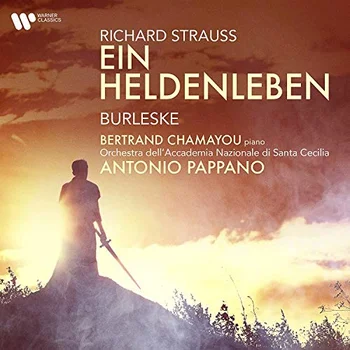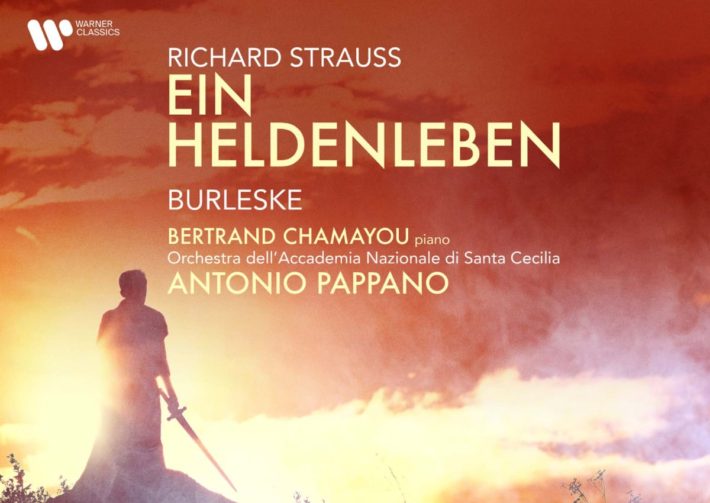This is the second major release featuring Pappano since we learned he will become the London Symphony Orchestra’s chief conductor after Simon Rattle departs for Bavaria. His recent LSO Vaughan Williams recording has met with considerable acclaim, including on these pages. Pappano has recorded Strauss only once before, in a 2007 recording of “Four Last Songs” and the final scenes from Capriccio and Salome, featuring Nina Stemme and the Orchestra of the Royal Opera House, Covent Garden.

Pappano has been at the helm of his Italian orchestra since 2005 and during his tenure they have become an excellent ensemble, the strings particularly sweet toned. There is a brightness to their sound that in Strauss’s music at times feels too lightweight. Winds have plenty of character though their contribution is sometimes obscured by Warner’s string-centric engineering. While the orchestra plays with great passion and refinement, there is not Teutonic weight and opulence of sound heard from Karajan’s Berliners or Kempe’s Dresden orchestra. And both orchestras have a more intuitive and idiomatic sense of the style and spirit of Strauss.
Pappano also brings a different viewpoint to this work. Many of Strauss’s tone poems, “Ein Heldenleben” in particular, can come across as a blustery egomaniacal exercise in vanity. But Pappano takes great care over the music’s many quiet moments. This is especially true of “The Hero’s Companion” section, performed more slowly than the several other recordings I sampled. Pappano provides his concertmaster room for generous rubato and sensuous shaping of his solo, a musical portrait of the composer’s wife. Concertmaster Roberto González-Monjas’ playing is sublime, though his portrayal of Pauline is unrealistically winsome, whereas in Michel Schwalbé’s reading under Karajan one hears a more realistic portrayal of the companion’s multifaceted and sometimes brusque nature.
Strauss scholar Michael Kennedy describes the ending of this section as “a voluptuously scored love-scene.” But Pappano and his orchestra (exquisite oboe playing) find a delicacy and deep sensitivity that make it a genuinely intimate moment. Yet spending so much time over this section threatens loses a cohesive view of the entire work. The sense of inevitable sweep experienced with Kempe and Karajan is lost.
Pappano’s opera experience guarantees a fiercely dramatic battle and that the critics are strongly characterized. He also proves an excellent guide through “The Hero’s Works of Peace,” ensuring we clearly hear the composer’s extensive self-quotations. The orchestral winds are particularly wonderful (and audible) in this section. Pappano and his players also bring a sense of calm nobility to the final section, although Nelsons, leading the City of Birmingham Symphony Orchestra, is finer still.
Strauss’s Burleske remains stubbornly on the periphery of the piano/orchestra repertoire. The 21-year-old Strauss composed the work for Hans von Bulow, who found the piano part too difficult and never performed it. Rudolf Serkin’s recording with the Philadelphia Orchestra and Eugene Ormandy was the first (for many of us) to reveal the full genius of this music, though two other more recent recordings supersede that album: Thibaudet/Gewandhaus/Blomstedt/Decca and Hamelin/RSO Berlin/Volkov/Hyperion. Both recordings divulge the bewildering variety of moods in the music and show a close rapport between pianist and conductor. Bertrand Chamayou’s performance is just as winning – Pappano is a first-rate accompanist, following every one of Chamayou’s shifts of mood and inflection, all while ensuring the brilliance and sophistication of Strauss’s orchestration is fully revealed.
Warner Classic’s engineering is satisfactory, but no more. The recording, made live, has congested climaxes and the brass, especially the horns, do not ring out as they should. Those looking for a modern recording with excellent sonics should sample the performance by the SWR Symphony Orchestra under François-Xavier Roth. Warner’s engineering improves markedly in the Burleske, which was recorded in October 2020 without an audience.
Pappano’s “Hero” is real flesh and blood, not a swaggering, larger-than-life archetypal figure. While it is certainly a valid viewpoint, I am not convinced this is Strauss’s intention. Nevertheless, it is an interesting approach that other listeners may find wholly convincing. David Murray’s liner notes are very good, and the booklet features several pictures of the performers in concert and recording sessions.
Recommended Comparisons
Karajan | Ormandy | Kempe | Solti
Strauss – Ein Heldenleben, Op. 40, Burleske, TrV 145
Bertrand Chamayou – Piano
Orchestra Dell’accademia Nazionale Di Santa Cecilia
Antonio Pappano – Conductor



















